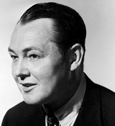 Charles Ray was a popular juvenile star in the 1910s and ’20s, but by the ’30s, his career was on the rocks, and he turned to writing. Here’s another in a series of offerings from his book, Hollywood Shorts, a collection of short stories set in Tinseltown.
Charles Ray was a popular juvenile star in the 1910s and ’20s, but by the ’30s, his career was on the rocks, and he turned to writing. Here’s another in a series of offerings from his book, Hollywood Shorts, a collection of short stories set in Tinseltown.Windows, windows, nothing but windows up and down the narrow hotel court. He had sat counting them many times lately, during the long hours of waiting for a telephone call from Central Casting Office.
But the waiting was all over now. Thoughts of a possible career had faded. He would have to seek employment at anything he could find. This was the end.
Momentarily his eyes rested on the lighted window straight across the court—her window. He had never met the occupant of that apartment, but had often gazed into the windows from the dark recesses of his own room. Not a nice thing to do; yet his actions were not those of a peeping Tom. They were more like a Romeo, with Romeo’s mood and lines:
| “O that I were a glove upon that hand, That I might touch that cheek!” |
Just now, as he saw his dream girl move into view to answer her telephone. “Tomorrow,” he read easily on her lips, and from her expansive frown, realized that the single word did not satisfy the party on the other end of the wire.
Quite distraught, she started pacing the floor, twisting her handkerchief, seeming ready to burst into tears.
He could not summon any pity for her. His own troubles surmounted any that another human could possibly have. No one could be placed in the same miserable, deplorable condition as he.
The girl’s pacing and turning afforded clear scrutiny of her beauty. Jet-black hair fell in fluffy waves over a well-chiseled brow, crowning a lovely face with glory. He sensed long lashes, veiling eyes that he felt sure were golden brown. Too thin a figure, he criticized unconsciously.
Stopping abruptly in her pacing, the girl lifted her head haughtily and said: “Come in.”
The door swung open, revealing the clerk. He carried a bunch of keys, and ordered the emotional girl into the hall.
The eviction made the boy’s blood run cold. Grabbing several envelopes, he rushed out to the mail chute, and stood as if occupied, to listen.
“But had I only known,” he heard his dream girl plead.
“You can’t tell me that the manager hasn’t warned you many times,” the clerk insisted, demanding her key. “Six o’clock tonight was the limit of his endurance, he told me to inform you. I do hope you will understand that this duty is painful to me,” he concluded, bolted the door, and left the evicted girl crying against the wall like a child locked in a closet.
Edging very close, the sympathetic boy stammered: “May I—could I be of any assistance?”
She looked up through moist eyes which he saw were hazel.
